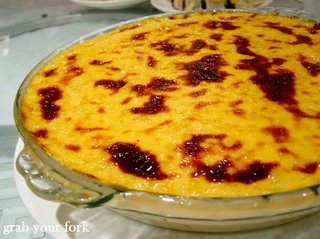
 Omanis are well
known for their hospitality, as a result being invited to an Omani home equals
tons of food. Upon arrival you´ll be seated on the floor around a plastic
tablecloth. They will then usually serve coffee, called kahwa, which is a
strong, bitter drink flavored with cardamom, and dates, called halwa. After a
short while, dish after dish is placed on the floor. Rice with chicken or lamb
marinated with special spices, like qabuli and djaj foug el eish, fish,
seafood, hummus (dip made of chickpeas), bread and salads. The Omani cuisine
borrows Asian flavors and incorporates them into typical Omani dishes, making
the taste of the food unique. Then, it´s time to eat all of this food, and you
are expected to eat quite a lot. After having switched sitting positions
multiple times and eaten excessively much food, both delicious and
unaccustomed, you are filled up and tired, but most of all feeling grateful for
having this experience. However, the meal isn´t done yet. The dishes (which in
no way are emptied) are at this point taken away, and soon the dessert appears.
This may be lemon bars, which is a cake made of butter, sugar, flour, eggs, and
lemon. Another Omani dessert is the sako, which is a sweet caramelized tapioca
pudding, made of saffron, sugar, rosewater (from Jebel Al Akhdar), ginger,
cinnamon and cardamom. Nuts, such as pistachios or walnut, are sometimes
chopped into the pudding as well. At this point, you´re more or less finished
with the dinner. Furthermore, one usually stays for a little while longer just
to talk, before heading home.
Omanis are well
known for their hospitality, as a result being invited to an Omani home equals
tons of food. Upon arrival you´ll be seated on the floor around a plastic
tablecloth. They will then usually serve coffee, called kahwa, which is a
strong, bitter drink flavored with cardamom, and dates, called halwa. After a
short while, dish after dish is placed on the floor. Rice with chicken or lamb
marinated with special spices, like qabuli and djaj foug el eish, fish,
seafood, hummus (dip made of chickpeas), bread and salads. The Omani cuisine
borrows Asian flavors and incorporates them into typical Omani dishes, making
the taste of the food unique. Then, it´s time to eat all of this food, and you
are expected to eat quite a lot. After having switched sitting positions
multiple times and eaten excessively much food, both delicious and
unaccustomed, you are filled up and tired, but most of all feeling grateful for
having this experience. However, the meal isn´t done yet. The dishes (which in
no way are emptied) are at this point taken away, and soon the dessert appears.
This may be lemon bars, which is a cake made of butter, sugar, flour, eggs, and
lemon. Another Omani dessert is the sako, which is a sweet caramelized tapioca
pudding, made of saffron, sugar, rosewater (from Jebel Al Akhdar), ginger,
cinnamon and cardamom. Nuts, such as pistachios or walnut, are sometimes
chopped into the pudding as well. At this point, you´re more or less finished
with the dinner. Furthermore, one usually stays for a little while longer just
to talk, before heading home.It is important to note that Omanis usually bring generous gifts to both the adults and the children when visiting others. Bringing a gift is in no way obligatory, but it is a way of showing gratitude, and by doing so you won´t end up feeling bad when they visit your house with beautiful gifts.

Ingen kommentarer:
Legg inn en kommentar